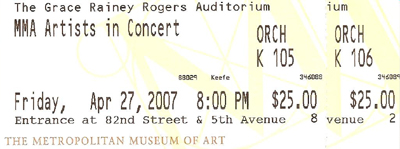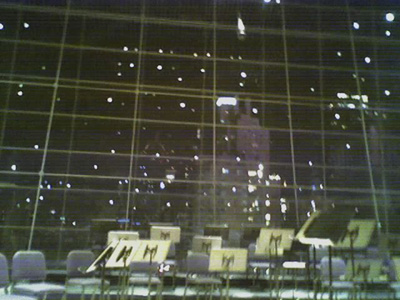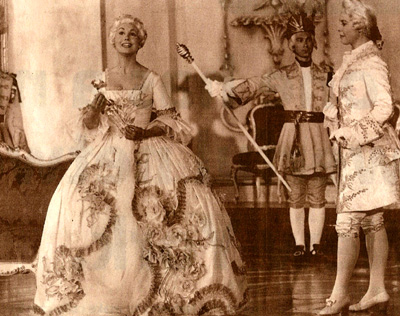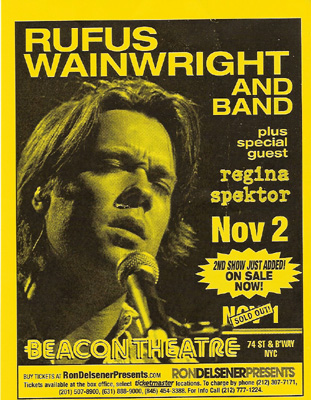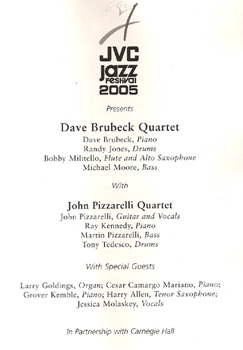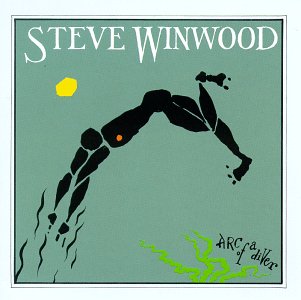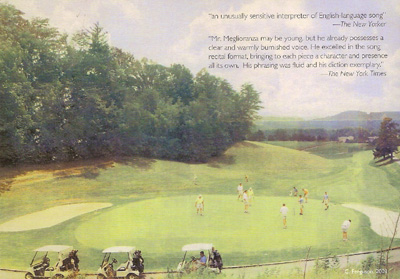
Last Thursday night, Thomas Meglioranza gave a recital at the
Thalia at Symphony Space. When I got there, I wished I'd brought a camera,
because Tom's name was running around in lights on the marquee ribbon. The recital,
sponsored by the Concert Artists Guild together with Symphony Space, featured
pianist Reiko Uchida and violinist Jessica Lee.
As the intriguing postcard announcing the recital made clear, the program
would consist of works by living American composers. Not too long ago, it would
have taken several earth movers to get me to show up for such an event. Most of
the contemporary American music that I've heard is either jazz-inflected, which
is agreeable but something of a cop-out, or blandly aimless and anodyne. On top
of that, it is so often in English! Which, when it comes to full-throated
singing, is a language that I grasp only with difficulty; German and Italian are
so much more intelligible, even if I don't know what the words mean. But if I
was happy to go to Tom's recital, it wasn't because I'd be doing him any favors
by padding out the audience. I've learned, in the past year, that Tom
Meglioranza is an exceptional singer with a very strong gift for performing
(among other things!)
music by living American composers.
What I didn't expect (aside from Tom's name in lights) was a brilliantly
composed program. I don't mean that it was perfect. But it was built to grow, to
cultivate over what I hope will be a long and fruitful career. I have never
heard another singer (no, not even Dawn Upshaw) with Tom's ability to render art
songs the respect that is their due while making them not only thoroughly
approachable but really great to hear. You can check your sense of duty at the
door and trust that Tom will entertain you. How does he do
it? The short answer is that his commitment to the music is total. The beautiful
voice, the skilful execution, the personal charm - these are all very well, and
Tom has them in spades. But he believes in what he is singing. Perhaps it would
be more helpful to say that his voice believes.
The program began with "The Pregnant Dream," by Aaron Jay Kernis, who also
composed the last work on the program, "A Song on the End of the World." "The
Pregnant Dream," which I'd heard Tom sing at the Naumburg competition last
spring, sets a droll poem by May Swenson.
I had a dream in which I had a dream,
and in my dream I told you,
"Listen, I will tell you my dream,"
And I begin to tell you. And
you told me, "I haven't time to listen while you tell your dream."
Mr Kernis's setting turns the much-repeated word "dream" into a humorously
maddening ostinato - humorous because, in the dream, the dreamer couldn't
remember the dream. This a capella number hides its virtuosity with a
smile, and it was the perfect opener to the recital that followed.
David Liptak's Under the Resurrection Palm is a set of three songs to
verse by two poets, Linda Pastan and Rita Dove, for voice and violin.
Unsupported by a piano, the voice sounds vulnerable next to the violin, and that
suits the poetry very well. "The Bookstall," a bibliophile's fancy run loose,
but finding a serene climax in the line, "every book its own receding horizon,
was my favorite here. Next on the program - Ms Uchida, the gifted accompanist
with whom Tom works when he can, made her first appearance here - was Russell
Platt's The Muldoon Songs, setting four poems by Irish poet Paul Muldoon.
Once again, I was treated to the second performance of something that I'd heard
at the Naumburgs (the cycle's first song, "Cuba"). The Muldoon Songs and
Into the Still Hollow, by John Rommereim - the music that followed - were
the only items in the program that seemed ordinary to me. Mr Rommereim's setting
of WS Merwin's poem is a set of seven linked monologues, delivered by archetypal
characters ("King," "Scholar," and so on), each one ending in the Latin tag, "Et
ecce nunc in pulvere dormio." I did not find enough distinction between these
characters, and if it hadn't been for the Latin, I wouldn't have known where one
stopped and the next began. But I suspect that I was alone here; the audience
clearly liked both the Platt and the Rommereim.
After a brief pause. Tom sang a bitter song by Milton Babbitt, "The Widow's
Lament in Springtime." Its text, by William Carlos Williams, compresses a
widow's grief into an inability to delight in the blossoming of her beloved
fruit trees. Love and death are not mentioned, making the sense of loss as stark
as Mr Babbitt's music, which is sore beyond regret. Arresting on its own,
"Lament" prepared the audience for The Plundered Heart, a set of two
songs written by Jorge Martín and commissioned expressly for Tom. This was the
dramatic high point of the evening. The poems, by JD McClatchy - "Fado" and
"Pibroch" (Portuguese and Scottish folk forms, respectively) - follow the
anguish of jealousy with the numbness of loss. The piano writing never shakes
off the beating heart that constitutes the startling image of "Fado"; in
"Pibroch," a low-throbbing pulse alternates with chords of Celtic placidity - a
placidity that, having nothing to do with the sentiment of the text, powerfully
underscores the lover's hopelessness. (It shouldn't work, but it does.) I was as
wrapped up in all of this as I've ever been in any opera, and deeply shaken when
it was over.
Derek Bermel's Nature Calls is a set of three delightful songs, to
verse by Wendy S Walters, Sylvia Plath, and Naomi Shihab Nye. "Spider Love" is a
wicked vamp on an ancient theme (don't say you weren't warned about romance).
"Mushrooms" rather fearfully announces the conquest of the earth by stealth:
"Our foot's in the door." The final song, "Dog," is a barcarolle that
compares the sky to the belly of a sleeping canine; it couldn't be gentler. Mr
Bermel's vocal line was perhaps the most dynamic of any of the songs; it had
something of the spunk of Ned Rorem's jauntier pieces.
Aaron Jay Kermis's "A Song on the End of the World," for voice, violin, and
piano, sets a poem written by Czeslaw Milosz in 1944. A hauntingly arched phrase
violin phrase brackets the song's decidedly unapocalyptic meditation on final
things that, musically at least, has it two ways - beautiful music for an
ominous proposition. It was the perfect formal close to the recital. As an
encore, Tom sang Stephen Foster's "I Dream of Jeanie," to accompaniment written
by Ned Rorem. Oh, what a difference Mr Rorem's accompaniment makes! Instead of
the sugary chords and curlicues that nineteenth-century practice would dictate,
the piano sets the voice free with a string of loose, wide-ranging arpeggios.
The recital absolutely at an end, all I could think of was a line from
Wallace Stevens's "Credences of Summer":
This is the barrenness
Of the fertile thing that can attain no more.
The barrenness was in my ears; I could hear no more music that night.
